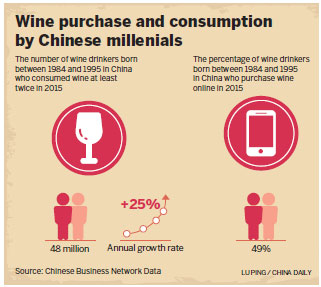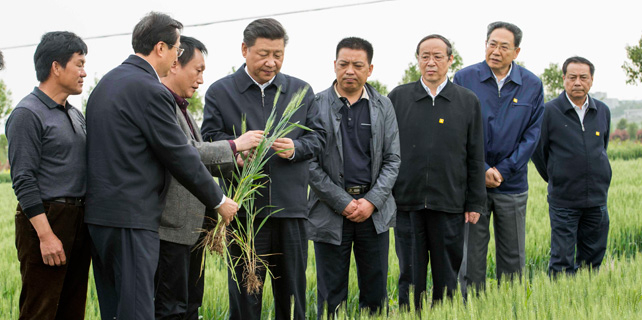Online wine seen as the new gold mine in China

When Xie Chen first began to sell imported wine on Taobao.com, China's largest online marketplace, in 2013, he had little clue where and who his customers would be.
Less than three years later, the 30-year-old has managed to sell between 10,000 and 30,000 bottles of wine every month on his online store called Mihu Wine Shop, which translates to "a little dizzy" in Chinese.
"That's the magic of e-commerce. The customers may be invisible and impossible to locate at first, but once you reach them and speak to them using the right language, it's also impossible to lose them," said Xie, who was formerly a salesman at a multinational chemical company.

The customers Xie have attracted are mostly young female professionals who are still in search of their preferred wine instead of discerning connoisseurs. As such, he is mindful of how he communicates with his audience.
"We don't talk about how to hold the wine glass, how to tell the difference between new world and old world produce, or terroir. It's simply pointless," said Xie.
Instead, he provides practical tips such as the brand of Moscato that is best paired with spicy chips for a relaxing weekend movie night and the most value-for-money Sauvignon that people can use as a gift for an important occasion.
A report by the Chinese Business Network Data showed that nearly half of China's millennial generation - those born between 1984 and 1995 - prioritise online channels for purchases of wine and other types of alcohol.
This generation of millennials, which has an estimated population of 48 million, has also demonstrated a growing interest in drinking wine during social occasions and as a personal treat, a stark contrast to the older generation which still favors baijiu, a Chinese traditional alcohol.
The report found that convenience and value for money are the two primary reasons the younger generation are turning to wine. Furthermore, UK consultancy Wine Intelligence discovered that the number of people who rank quality as their top priority rose from 14 percent in 2014 to 26 percent in 2016, suggesting that the market is becoming more sophisticated.
Wang Yanyan, executive editor and researcher with Shanghai International Wine Exchange Center, noticed that alcohol companies and e-commerce sites have since 2015 been striking up more partnerships.
She added that alcohol companies had identified the e-commerce market as a means of combating the decline of the industry, which was hit hard by two factors: China's anti-corruption campaign and economic slowdown. According to the National Statistics Bureau, the alcohol industry had for the first time in history experienced a negative 2 percent growth rate in 2014.
That same year, China's alcohol market consolidated 877.9 billion yuan ($129.3 billion) of sales, of which 1.25 percent came from the online market, based on figures by e-commerce consultancy Analysis International.
The e-commerce market, however, was seemingly unaffected by these two factors as they continued to enjoy robust growth. In 2015, the size of China's e-commerce market reached 16.4 trillion yuan, up by 22.7 percent from the year before. In addition, online retail rose 36.2 percent year-on-year.
Today, many e-commerce alcohol retailers have been eager to ensure that they only sell genuine wine and some even have lofty ambitions of getting listed on the stock market. However, Ian Ford, co-founder of Summergate, one of China's leading wine importing companies, has offered a more "sobering realization" of the current situation.
"There are still lots of people out there who want to buy wine from a human being, who want to go into a shop and hold the bottle, and who want to taste a selection of wines before they actually decide to buy. And this is not going to go away," said Ford, during a wine forum held in Shanghai.
Ford also referred to Alibaba's 9.9 Global Wine and Spirits Festival, which took place on Sept 9, saying that the event had not done as well as expected, especially for imported wines.
"Everyone that I know and have spoken to in the wine industry tells me that they didn't sell very much imported wine during the festival. There was a lot of buzz surrounding imported wines but it was traditional Chinese wines that did very well instead," said Ford.
"When you get such a result even after having the most powerful guy in the Internet world standing up and declaring a global wine day and investing the entire efforts of his organizations, I think some real introspection is required," he added.
Wen Wenyi contributed to the story.
xujunqian@chinadaily.com.cn
















